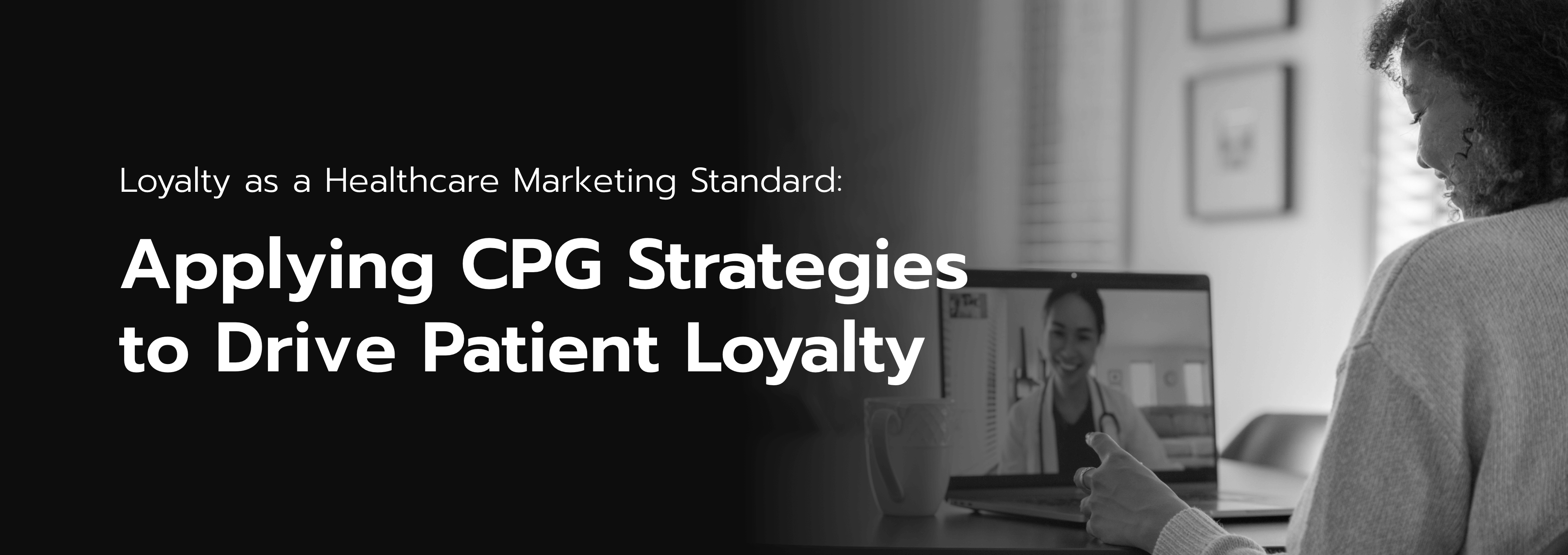
In healthcare, we often approach patients differently from consumers in retail settings, and understandably so. Healthcare involves sensitive matters, and relationships with patients are higher stakes.
However, the healthcare sector is witnessing rising discourse around loyalty. The need is demonstrated by a 2021 NRC Health study that found 1/3 of consumers are indifferent to healthcare brands. While still largely conceptual, advancements in technology and the growing need for personalized experiences are paving the way for turning this concept into a reality. With time and success, building loyalty in healthcare will likely evolve into an industry standard.
There’s a valuable lesson to be learned from consumer-packaged goods (CPG) loyalty strategies. While the patient’s mindset is much different than a shopper’s, their connection to different brands shares similarities. Healthcare companies can benefit from adopting a CPG loyalty mindset to enhance patient engagement and loyalty.
CPG Strategies Applied to Healthcare

1. Multi-Channel Experience
A multi-channel approach ensures a seamless blend of online and offline experiences, spanning websites, mobile apps, and physical locations.
Healthcare organizations can miss the mark in engaging patients cohesively and consistently. Patients need to navigate through various channels like online portals, mobile apps, telemedicine platforms, social media, email, and face-to-face interactions.
Moreover, these interactions shouldn’t operate in isolation. Each touchpoint should seamlessly integrate into a patient’s unique journey. This unified approach cultivates patient loyalty by delivering consistency, personalization, and convenience. It also streamlines communication, harnesses data-driven insights, and guarantees ongoing care.

2. Brand Advocacy Programs
Brand advocacy programs encourage satisfied customers to become brand advocates by sharing positive experiences, referrals, and user-generated content that strengthens loyalty and attracts new customers.
In healthcare, brand advocacy is vital in creating a sense of community and belonging among patients. Encouraging and rewarding positive word-of-mouth, testimonials, and patient advocacy initiatives can significantly impact how patients perceive and engage with your brand. By empowering patients to share their experiences online or in person through groups facilitated by your organization, loyalty is fostered through connections with peers and a sense of community.

3. Personalized Marketing
Personalized marketing involves utilizing data analytics to tailor promotions, recommendations, and communications according to customer preferences, behavior, and history.
In the CPG space, this approach often focuses on product promotions. However, in healthcare, the emphasis shifts away from direct sales. For instance, when patient data indicates a specific ailment or treatment, a healthcare organization can deliver targeted content, like an article or video, on that topic. Note: patient consent is crucial, and all targeting must comply with HIPAA regulations
This engages the patient with relevant information, strengthening your relationship. Research shows that 61% of patients express a willingness to visit a provider more frequently if they perceive the communications to be personalized to their needs.

4. Loyalty Programs
In a CPG context, offering rewards, discounts, or points-based systems for repeat purchases encourages customer loyalty and retention.
However, loyalty programs in healthcare should focus on promoting patient wellness actions. These programs can reward healthy behaviors, consistent adherence to treatment plans, regular check-ups, and active participation in wellness initiatives.
What do rewards for healthy behaviors look like? Consider offering incentives like discounted routine healthcare services, access to exclusive educational resources, and health-related merchandise – all of which can significantly impact patient loyalty and engagement.
The evolution of loyalty in healthcare presents a clear imperative: drawing inspiration from seasoned industries presents new opportunities for healthcare marketing. While patient relationships differ from that of the traditional consumer, personalized experiences and incentives remain key. The growing acceptance of loyalty as a healthcare marketing standard, alongside patient indifference, emphasizes an opportunity for organizations to implement a loyalty strategy. Adopting a CPG loyalty mindset could not only improve patient engagement but could also forge enduring relationships rooted in trust and tailored care.
![]()
Ready to strengthen patient loyalty and create strong long-lasting relationships?
Collaborate with an experienced partner to create or enhance your healthcare loyalty strategies.